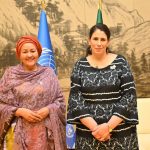Unlocking Nigeria’s Informal Sector: Pathways to Formalizing Skills and Empowerment for National Growth
By Dr. Aiyeku Olufemi Samuel
Co-Founder & Lead Consultant, Global Human Capital & Energy Management Limited
Governance Analyst | Development Economist | Policy Consultant | Strategic Development Advocate | Climate Action Enthusiast | Sustainability & Impact Investing Specialist | Girl-child Advocacy | PPP & CRM Specialist
“The informal sector is not a problem to be solved—it is a potential waiting to be unlocked.”
— Anonymous Nigerian Economist
Nigeria’s economy is driven more by its roadside than its boardrooms. From tailors and tilers to pepper sellers and phone repairers, the engine room of the Nigerian economy is the informal sector—a space often overlooked by formal structures, yet indispensable to national survival.
The Numbers Don’t Lie
According to the National Bureau of Statistics (NBS), over 65% of Nigeria’s total workforce is engaged in the informal sector. The International Labour Organization (ILO) estimates that the sector contributes about 57.9% of Nigeria’s GDP. Yet, this massive demographic remains under-documented, under-regulated, and under-empowered.
So we must ask:
How can an economy thrive if its largest sector is structurally invisible?
Can a nation grow sustainably when its most entrepreneurial citizens operate in shadows?
The answer is obvious: We must formalize the informal—not to over-regulate, but to empower.
What Is the Informal Sector—And Why Does It Matter?
The informal sector refers to economic activities that are not taxed, monitored by any form of government, or included in a country’s gross national product. These include:
Street traders
Vulcanizers, tailors, carpenters
Artisans, mechanics, bus drivers
Petty service providers and freelancers
Local agribusinesses, barbers, caterers
These people are not criminals. They are entrepreneurs by necessity—innovating with limited tools, surviving without support, creating jobs without incentives.
Yet they face daunting challenges:
No access to loans or credit facilities
No health insurance, pension, or social safety nets
No legal recognition or IP protection
Exploitation by touts and multiple levies from unregulated agencies
The Rhetorical Dilemma
Why haven’t we empowered them?
Because we often mistake informality for inferiority.
What if we changed the lens and saw them as partners—not problems?
Case Study: Tailors, Tech, and Trade
In Aba, Nigeria’s commercial nerve for textile production, local tailors produce millions of garments monthly, yet few are recognized globally or have access to export licenses.
With proper training, branding, tech platforms, and access to micro-financing, Aba tailors could become Nigeria’s Ralph Laurens.
The same is true of thousands of mechanics who fix cars but lack automotive diagnostic skills, or roadside caterers who could become culinary entrepreneurs with food safety certification and business training.
What Needs to Happen: Pathways to Formalization
1. Skills Identification and Certification
The government and private sector must develop a national artisan skills registry. Through programs like NAPTIP, SMEDAN, and NSIP, informal workers can be tested and certified using Recognition of Prior Learning (RPL) frameworks.
2. Mobile-Friendly Digital Identity & Tax Platforms
Many informal workers are willing to pay micro taxes in exchange for benefits—if systems are simple, fair, and beneficial. Technology platforms like TraderMoni, Bank of Industry (BOI) MSME tools, and fintech wallets can create that bridge.
3. Cluster Hubs and Cooperatives
Organizing workers into sector-based cooperatives or guilds can provide them access to bulk procurement, group insurance, micro-loans, and better policy representation.
4. Public-Private Partnerships (PPP)
Development partners and NGOs must work with local governments to support skills incubation centers, affordable micro-housing for informal traders, and mobile health insurance schemes.
5. Legal Reforms & Simplified Business Registration
CAC and SMEDAN must roll out single-page registration frameworks in local languages, allowing informal workers to formalize their businesses in a day, without bureaucracy or excessive fees.
6. Incentives Instead of Penalties
Shift from forceful taxation to incentive-driven inclusion. Provide access to market stalls, government contracts, solar energy kits, or uniforms in return for joining formal registries.
Rhetorical Pause: Who Are We Leaving Behind?
Is it not hypocritical to call for job creation while ignoring the creators of jobs?
Is national growth truly inclusive when our most industrious people remain undocumented?
We cannot continue to build policies for people we’ve never counted.
Youth, Women, and the Future of Informal Labour
Women and youth dominate Nigeria’s informal sector—especially in food vending, hairdressing, logistics, tailoring, and mini-trade. Yet, they’re the least protected and most vulnerable.
In the words of Nobel Laureate Muhammad Yunus:
“Poor people are bonsai people. There’s nothing wrong with their seeds—just the soil they’re planted in.”
Let us change their soil.
The Prize: An Empowered Informal Economy
If Nigeria formalizes 25% of its informal sector by 2030, it could:
Add over ₦5 trillion to GDP
Generate 10–15 million jobs
Raise government revenue by over ₦1 trillion annually
Improve financial inclusion for over 40 million people
It’s not just economics. It’s nation-building.
Conclusion: Informal, Not Illegal
We must stop criminalizing informality and start building bridges of empowerment.
These entrepreneurs are not invisible—they are indispensable.
They are not Nigeria’s backstreet—they are its backbone.
The goal is not to force them into bureaucracy, but to offer them the opportunity to be seen, heard, protected, and supported.
So we ask again:
Can Nigeria rise if its greatest hustlers are held down?
Only when the informal economy is formalized will Nigeria’s growth be truly national.
Let us act now—because empowering the grassroots is the smartest investment in our future.
Dr. Aiyeku Olufemi Samuel
Co-Founder & Lead Consultant,
Global Human Capital & Energy Management Limited
Email: aiyekuolufemi@gmail.com
Phone: 0802 545 1262 |
0803 786 6085 |












